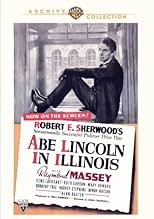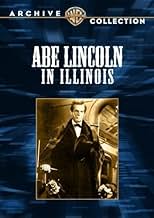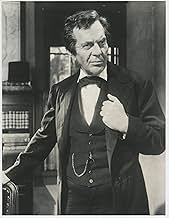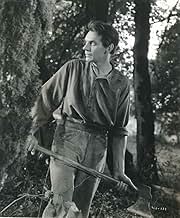AVALIAÇÃO DA IMDb
7,3/10
2,2 mil
SUA AVALIAÇÃO
Adicionar um enredo no seu idiomaHumble Abraham Lincoln gains the respect of his Illinois neighbors, growing in stature and respect until he is elected President in 1860 and departs for Washington.Humble Abraham Lincoln gains the respect of his Illinois neighbors, growing in stature and respect until he is elected President in 1860 and departs for Washington.Humble Abraham Lincoln gains the respect of his Illinois neighbors, growing in stature and respect until he is elected President in 1860 and departs for Washington.
- Direção
- Roteiristas
- Artistas
- Indicado a 2 Oscars
- 2 vitórias e 2 indicações no total
Howard Da Silva
- Jack Armstrong
- (as Howard da Silva)
Avaliações em destaque
If you've ever wanted to hear what Abe Lincoln sounded like, this is the film you'll want to see. Lincoln is portrayed by the late Canadian actor Raymond Massey - who, amongst many other roles, is also remembered from HG Welles' Things to Come, the screenplay of which was written by HG Welles himself. Early in Massey's career, Lincoln's son, Robert Todd Lincoln, heard him perform and was struck by the similarity between Massey's speaking voice and that of his father. Since there are no recordings of Lincoln from that era shortly before Edison invented the Gramophone, we have to rely on descriptions of his voice. Some from that time state Lincoln's voice was high-pitched, and that Massey did not do the voice properly - however, I tend to give more credence to a living witness, Lincoln's own eldest son who, though he died 14 years prior to this film, still had the opportunity to see Massey on stage and hear his voice. Massey got it right, and this is one wonderful film - too bad I haven't found it on DVD - the next time it airs on TMC I'll have to record a DVD of it for myself.
If only we could've cloned Mr. Massey back in 1940, and then waited for a scriptwriter who could take a more controlled hand with historical accuracy than was fashionable in those days, and released the movie today...this remains my favorite treatment of one of my favorite historical figures; Massey seems born to have played Lincoln, from the obvious physical resemblance to the supposed mannerisms, and in doing so far outshines other Lincoln performances (Fonda's and Peck's come to mind). My peeve with the film is with historical detail, and I realize that Hollywood willingly sacrifices accuracy for dramatic artifice without so much as a blush...
Episodic recounting of Lincoln's life up to the Presidency. Written by Robert Sherwood, one of FDR's speechwriters. Good performances by Ruth Gordon, Alan Baxter, Howard DaSilva, Clem Bevans.
Massey is the definitive movie Lincoln. Excellent work, emotional range and depth. Much better than Henry Fonda, whose Lincoln was apparently in some kind of trance.
May seem a little dated to modern audiences; occasionally strives for emotional poignancy that now comes across as somewhat corny.
Lots of little details, good depictions of frontier life, political campaigns in the 1800's. Includes two of Lincoln's best speeches from that period, with Massey's performance very close to Lincoln's 19th century oratorical style.
Highly recommended to students of American history and fans of old movies.
Massey is the definitive movie Lincoln. Excellent work, emotional range and depth. Much better than Henry Fonda, whose Lincoln was apparently in some kind of trance.
May seem a little dated to modern audiences; occasionally strives for emotional poignancy that now comes across as somewhat corny.
Lots of little details, good depictions of frontier life, political campaigns in the 1800's. Includes two of Lincoln's best speeches from that period, with Massey's performance very close to Lincoln's 19th century oratorical style.
Highly recommended to students of American history and fans of old movies.
Abe Lincoln is one of the most misunderstood figures in American history--perhaps THE most misunderstood. So much of what we assume are facts are actually myths and misrepresentations--some of which were promoted by writers and some by films of the 30s and 40s. While ABE LINCOLN IN ILLINOIS is far from perfect, it is light-years ahead of the other contemporary works in giving a balanced account of Lincoln's life. While heroic in many ways, Lincoln is more of a man in this film and the facts are generally true--and that's a lot more than can be said of such sentimental hogwash as D.W. Griffith's 1930 fiasco ABRAHAM LINCOLN--which is basically one myth after another strung together!! I can say all this because I am well educated about the man and am an American history teacher--so my opinion should mean something.
One of the common myths that has abounded was the Ann Rutledge romance. While it's uncertain exactly how much they were in love (was it just a passing romance or something deeper), it's obvious that they were NOT as they were portrayed in ABRAHAM LINCOLN with all of its syrupy sweetness. Read up on the controversy yourself--opinions vary and there's no concrete evidence to prove either extreme. Here in ABE LINCOLN IN ILLINOIS, they seem to take the position that the love between them was just beginning to blossom when she died and that that was about it.
Another myth is that Lincoln was 100% against slavery and that he personally freed the slaves (that was actually done by Congress and the 13th amendment). The real life Lincoln, though opposed to slavery, was more concerned with unity and preserving the nation. Fortunately, ABE LINCOLN IN ILLINOIS gets this right--they show Lincoln as being torn by these two divergent interests. Most books and films portray him as "the Great Emancipator"--though Lincoln would have allowed slavery to keep the country from war and he did see class distinctions between the races.
The other big myth is that Lincoln was sort of a "dumb hillbilly" and that he stumbled into greatness. While in this film he is a simple man, of sorts, he also is amazingly clever and has a great way with dealing with people. And, occasionally, he was a bit devious. While the film doesn't have a chance to show his political savvy and willingness to "forget" the Constitution during the war in order to keep the country together, he is relatively shrewd in this film.
As for Mary Todd, in the film as in real life, she was a conniver and a very unstable woman. While her mental instability was only briefly shown in this film (as in reality--her mental condition greatly deteriorated after her husband was President as well as his death) but at least it was mentioned. Plus, her intense drive was a major focus of the film--as it was in Lincoln's own real life. She was a hard-driving and rather nasty woman if you read more about her (and rather mentally unstable in her later years).
As a long-winded teacher, I could go on, but probably should wrap it up now. The film is reasonably accurate and tends to show Lincoln, warts and all--something films up until then neglected. Additionally, Raymond Massey's performance was superb and the film was both entertaining and inspiring. Interestingly enough, Massey was a Canadian and did a much better job than the Americans who have tackled this role.
One of the common myths that has abounded was the Ann Rutledge romance. While it's uncertain exactly how much they were in love (was it just a passing romance or something deeper), it's obvious that they were NOT as they were portrayed in ABRAHAM LINCOLN with all of its syrupy sweetness. Read up on the controversy yourself--opinions vary and there's no concrete evidence to prove either extreme. Here in ABE LINCOLN IN ILLINOIS, they seem to take the position that the love between them was just beginning to blossom when she died and that that was about it.
Another myth is that Lincoln was 100% against slavery and that he personally freed the slaves (that was actually done by Congress and the 13th amendment). The real life Lincoln, though opposed to slavery, was more concerned with unity and preserving the nation. Fortunately, ABE LINCOLN IN ILLINOIS gets this right--they show Lincoln as being torn by these two divergent interests. Most books and films portray him as "the Great Emancipator"--though Lincoln would have allowed slavery to keep the country from war and he did see class distinctions between the races.
The other big myth is that Lincoln was sort of a "dumb hillbilly" and that he stumbled into greatness. While in this film he is a simple man, of sorts, he also is amazingly clever and has a great way with dealing with people. And, occasionally, he was a bit devious. While the film doesn't have a chance to show his political savvy and willingness to "forget" the Constitution during the war in order to keep the country together, he is relatively shrewd in this film.
As for Mary Todd, in the film as in real life, she was a conniver and a very unstable woman. While her mental instability was only briefly shown in this film (as in reality--her mental condition greatly deteriorated after her husband was President as well as his death) but at least it was mentioned. Plus, her intense drive was a major focus of the film--as it was in Lincoln's own real life. She was a hard-driving and rather nasty woman if you read more about her (and rather mentally unstable in her later years).
As a long-winded teacher, I could go on, but probably should wrap it up now. The film is reasonably accurate and tends to show Lincoln, warts and all--something films up until then neglected. Additionally, Raymond Massey's performance was superb and the film was both entertaining and inspiring. Interestingly enough, Massey was a Canadian and did a much better job than the Americans who have tackled this role.
With all due respect to Henry Fonda, Walter Huston, and a myriad of other cinematic Lincolns, Raymond Massey is the Abe to end all Abes. His moving and mesmerizing performance gives us the real Mr. Lincoln in all his complexity. Alongside the warmth, compassion and humor for which we love and revere Mr. Lincoln, we see in Massey the dark side as well: the doubts, fears, indecision and deep melancholia with which Abraham Lincoln struggled his whole life, and which clashed with his fierce ambition. Ruth Gordon is superb as Lincoln's equally ambitious wife, Mary Todd Lincoln. No hagiography, this movie lets us see the Lincolns as human beings with real "issues", rather than mere heroes of history.
Besides all this, we have Massey's astonishing physical resemblance to Lincoln.
What's most amazing is that the spirit of this most quintessentially American of our American heroes should be so wonderfully captured and portrayed by.... a Canadian!
Besides all this, we have Massey's astonishing physical resemblance to Lincoln.
What's most amazing is that the spirit of this most quintessentially American of our American heroes should be so wonderfully captured and portrayed by.... a Canadian!
Você sabia?
- CuriosidadesAfter his success playing Lincoln in the film and on Broadway, Raymond Massey began to assume the character in real life. He often appeared at social gatherings dressed in Lincoln-esque attire, assuming a Lincoln-like manner and speech. His friend, the playwright George S. Kaufman, observed, "Massey won't be satisfied until someone assassinates him."
- Erros de gravaçãoWhen results for the 1860 election are being received, West Virginia is listed on the the state-by-state tally board. West Virginia didn't become a state until 1863, when it broke off from Virginia after that state had seceded from the Union.
- Citações
Mentor Graham: Well, Abe, there are always two occupations open to those who have failed at everything else: school teaching and politics.
- ConexõesFeatured in History Brought to Life (1950)
- Trilhas sonorasOld Abe Lincoln Came Out of the Wilderness
(uncredited)
Traditional
Sung by chorus over opening credits
Principais escolhas
Faça login para avaliar e ver a lista de recomendações personalizadas
- How long is Abe Lincoln in Illinois?Fornecido pela Alexa
Detalhes
- Data de lançamento
- País de origem
- Idioma
- Também conhecido como
- El libertador
- Locações de filme
- Empresas de produção
- Consulte mais créditos da empresa na IMDbPro
Bilheteria
- Faturamento bruto nos EUA e Canadá
- US$ 1.451.880
- Tempo de duração
- 1 h 50 min(110 min)
- Cor
- Proporção
- 1.37 : 1
Contribua para esta página
Sugerir uma alteração ou adicionar conteúdo ausente


























